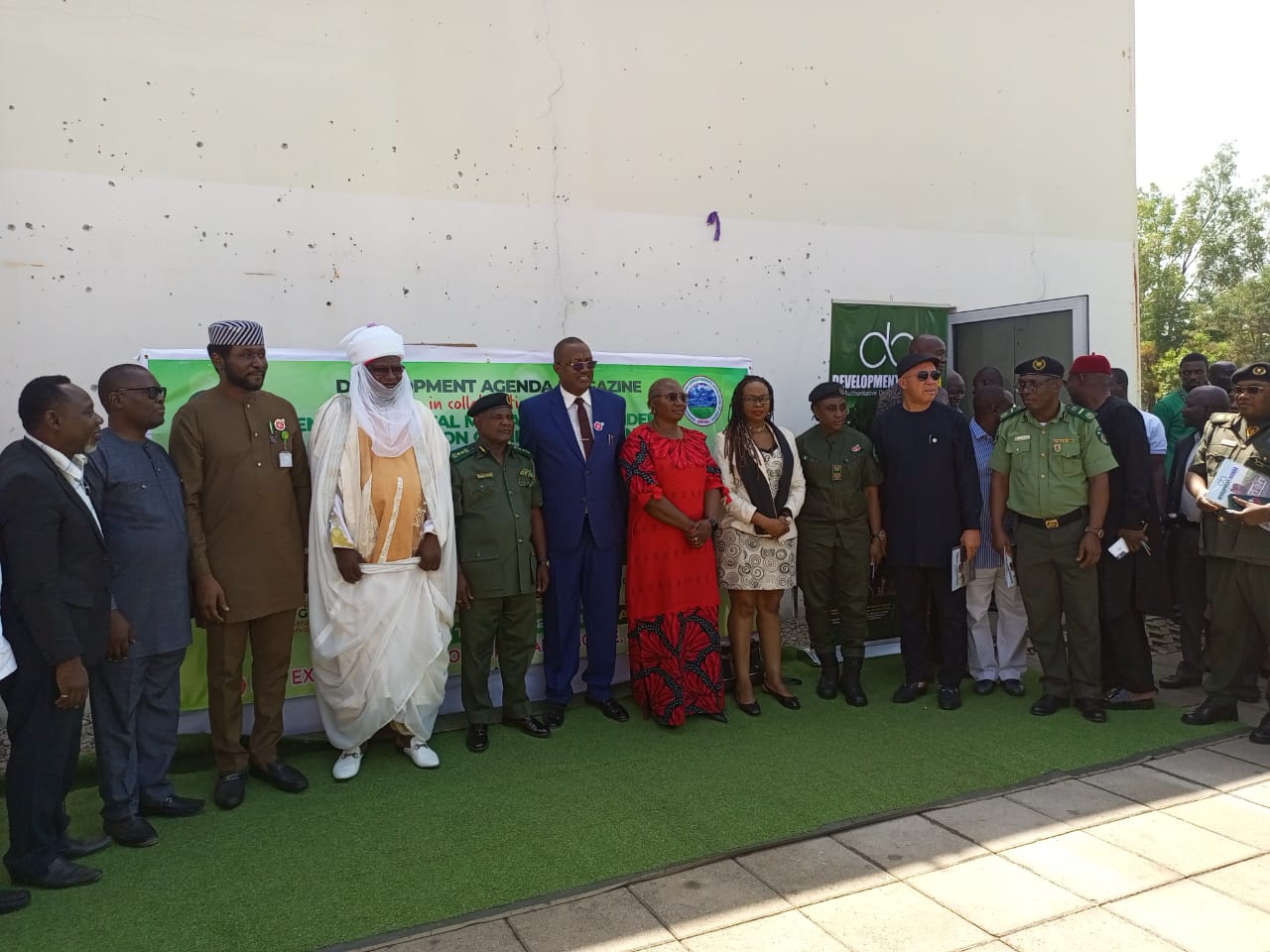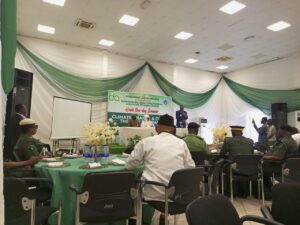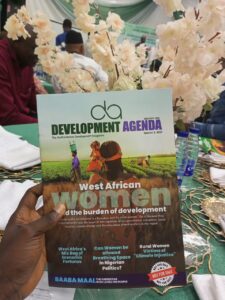
Reported by Paul Gwumapan Joseph
The Climate and Sustainable Development Network (CSDevNet) has made a call for more efforts to climate action as the Nation prepares to participate in the 28th climate change annual conference (COP 28).
This call was made during a one-day seminar organised by Development Agenda Magazine, in collaboration with the Environmental Media Correspondents Association of Nigeria (EMCAN) themed: “Climate Change & COP28: The Way Forward for Nigeria” on 7th November 2023 in Abuja, Nigeria.
The event convened representatives from various sectors, including Civil Society Organizations (CSOs), government officials, Non-Governmental Organizations (NGOs), and media outlets such as NTA, Channels TV, KaftanTV, Voice of Nigeria (VON), Aso TV, etc. The seminar also had esteemed guests, including the US Embassy representative, National Park Service (NPS), the Nasarawa State Emirates, and the Ford Foundation.
Giving his welcome address, Mr Paddy Izeala, Editor-in-chief of Development Agenda Magazine, highlighted the urgent need for action in Nigeria to address the adverse effects of human activities on the environment and climate change. He emphasised the pivotal role of women in society’s development.
Additionally, Dr Ibrahim Musa Goni, Conservator General at National Park Service, speaking as the chairman of the event stressed the significance of even small efforts in mitigating climate change challenges.
“Your efforts no matter how small is significant, in the fight against climate change,” said Dr Ibrahim.
He also advocated for the review of obsolete laws and policies in Nigeria, urging stakeholders to fast track this process.
Furthermore, HRH Ibrahim Jibril, the Emir of Nassarawa State, shared practices from his farm, emphasising the importance of changing perspectives and encouraging sustainable agricultural practices.
“You can’t stop people from using charcoal if you don’t provide an alternative,” he stated, “so we used sawdust, potato peel, and other farm waste as fuel.”
HRH Jibril said it was critical to shift people’s perceptions about using trash as a fuel source, conserving the environment, and encouraging local farmers to adopt these sustainable agricultural practices.
He also highlighted using farm waste as alternative fuel sources, fighting deforestation, and adopting renewable energy solutions.
The Director of the United Nations Industrial Development Organisation (UNIDO), Mr Bankole Jean, praised Nigeria’s potential in the fight against climate change and called for more enablers to achieve the goal. He also stated his intention to continue working with media organizations.
Mr Kayode from the US embassy’s Economic section gave his goodwill words, noting that he was there to observe on behalf of the US embassy in Nigeria.
Mr Paul Gwumapan Joseph, representative of CSDevNet, delivered a goodwill message, noting that he was there to represent CSDevNet. He also praised the event’s organisers.

Mrs Carol McIntyre, a National Park Service spokeswoman, also commended the organisers and emphasised the necessity of women’s participation in climate and environmental issues.
Hon Terseer Ugbor, Deputy Chairman of the Committee on Environment House of Representatives, emphasised the need for economic development focus at COP28.
He underscored the importance of synergy, effective adaptation actions, and robust communication strategies among stakeholders.
Development Agenda Magazine’s purpose was discussed during its public presentation, focusing on promoting climate action activities. During the public presentation, Mr Paddy provided a quick summary of the magazine and its focus on climate action. He stated that the objective of the magazine is to promote the actions of CBOs and individuals working on climate mitigation and adaptation.
HRH Alhaji Jibril Ibrahim launched the magazine, commending the publishers. Plaques were awarded to individuals and organizations for their significant contributions to climate action, acknowledging their efforts.
During the event, plaques were presented to the following persons in recognition for their contributions to climate action. (i) HRH Ibrahim Jibril, Emir of Nasarawa State (ii) Dr Priscilla Achakpa, Founder and Global President, Women Environmental Programme (iii) Prof Edem Eniang, Nasarawa Uni/UniUyo (iv) Hon. Terseer Ugbor, Deputy Chairman, Committee on Environment House of Representatives (v) Mr Michael Terungwa David, African Regional Coordinator, Citizens Climate International Team lead (vi) Ibrahim Musa Goni, Conservator General, National Park Service (vii) Prof Suleiman Mohammed, VC Nasarawa State University.
In the presentation, Prof Edem Eniang stated that nature finance is critical to climate justice. He emphasised the current impact of climate change on biodiversity, as well as the need of wildlife preservation, afforestation, and reducing carbon emissions.
Also, Dr Priscilla Achakpa’s presentation emphasised the need for understanding the processes of negotiations in COP before Developing internal position.
“This is a way to align with the Economic Community of West African States (ECOWAS), African Union (AU), United Nations (UN) and other regions because each regions have their unique demands. And journalists need to be part of the COP process for effective dissemination and communication,” she said.
She iterated the issues of ineffective policy implementation in Nigeria and stated that capacity building among Africa nations in negotiations and bringing in young people in negotiations through inter-generational knowledge transfer. She also emphasised that understanding terminologies and negotiating from the laws that guide the Nigerian government.
Mr Michael Terunga David, African Regional Coordinator, Citizens Climate International Team Lead, underlined the significance of collaboration between media and climate advocates, as well as climate funding for adaptation since the fight against climate change requires finance.
During the interactive session, practical steps for nations to negotiate climate finance for loss and damage were discussed. Additionally, strategies to create awareness on climate change among students and out-of-school youths were explored.

The seminar emphasised the critical role of implementation in climate action and advocated for active participation of Nigerian negotiators in preparatory sessions for COP effectiveness and readiness.
Among the key recommendations were:
- Ensure effective implementation of existing climate change policies and initiatives, emphasizing the importance of enforcement and accountability mechanisms.
- Encourage collaboration and synergy among various stakeholders, including government bodies, NGOs, CSOs, and media organizations, to enhance collective efforts in mitigating climate change impacts.
- Develop and implement comprehensive climate education programs in schools and communities to raise awareness about climate change, its impacts, and adaptive strategies.
- Empower women by providing them with opportunities for education, training, and leadership roles in climate and environmental advocacy.
- Engage and mentor young people, encouraging their active involvement in climate action initiatives and promoting inter-generational knowledge transfer.
- Advocate for increased funding and resources for climate change adaptation and mitigation projects, emphasising the need for adequate financial support to implement sustainable solutions.
- Encourage media organisations to prioritize climate change reporting, raising awareness and fostering a sense of urgency among the general population.
- Actively participate in preparatory sessions for international climate conferences, such as COP28, to ensure Nigeria’s representation is well-informed and effective in negotiations.
Overall, the seminar provided valuable insights and recommendations, emphasising the importance of collaborative efforts, policy review, and active participation in international climate initiatives to address the challenges posed by climate change in Nigeria.
